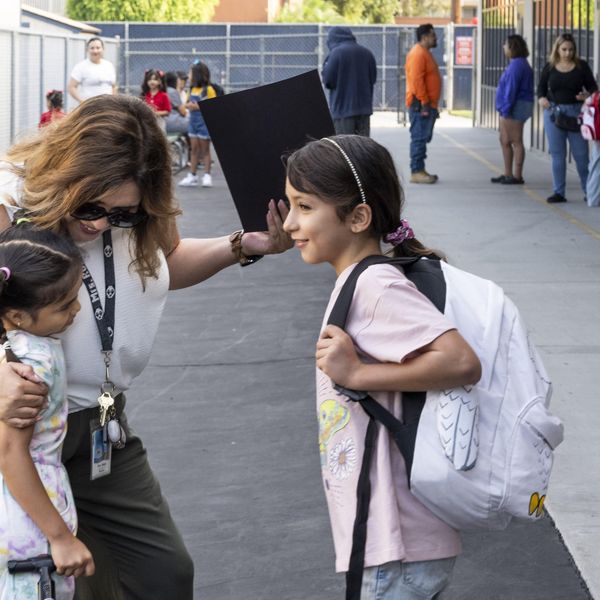Romney Challenged on Educational Reform at Philadelphia Charter School
Presidential candidate Mitt Romney made his views on education reform clear during a stop at a charter school in Philadelphia today, MSNBC's First Read reports. Romney championed school choice, teacher accountability and having straight, married parents as having a big impact on student success.
Romney emphasized his view on the importance of school choice in educational reform, which was challenged by David Hardy of Boys Latin of Philadelphia who said, "Why can't we have good schools in this neighborhood?"
Romney's statements on the irrelevance of class size on success was countered by a teacher who cited a studying showing high impact of a class size under 18.
"Having two parents in a home makes an enormous difference," Romney said on the issue of parental impact on children's educational success. "And so if we're thinking about the kids of tomorrow, trying to help move people to understand you know getting married and having families where there is a mom and a dad together has a big impact. And that's, in my view, that is critical down the road."
* * *
NBC's Garrett Haake: Romney faces tough questions in event driving education agenda
Romney's education reform policy centers around encouraging school choice, and a question by the CEO of another Philadelphia charter school system cut to the heart of the matter.
"Whenever they talk about providing education for low income kids, they always talk about sending them to a school somewhere else," said David Hardy of Boys Latin of Philadelphia. "Why can't we have good schools in this neighborhood?" [...]
"It's not the classroom size that is driving the success of [other nation's] school systems. And then [McKinsey] looked at it and said well what is driving the success of those school systems? It's parents very involved and the idea of choice means you have chosen to be involved, parents are involved, excellent teachers, drawing teachers from the very best and brightest of graduates," Romney said. "And administrators that are able to guide the school with good policies of discipline and getting the right resources."
But another teacher on the panel contested Romney's statements, citing a separate report.
"There was a study done by the University of Tennessee, a definitive study about class size and what they said was that in first through third grade, if the class size is under 18 those kids stay ahead of everybody else all the way through school, including classes where you might have 25 in the class and co-teachers," the teacher said. "Those students lose their gains after a couple years. If you have small classes in those primary years, those most important years, that's what makes the difference."
Romney rarely discusses social issues on the campaign trail, but today he made clear that his education policy has a home-based component as well, pointing several times to importance of an engaged, two-parent home in the progression of a child's education.
An Urgent Message From Our Co-Founder
Dear Common Dreams reader, The U.S. is on a fast track to authoritarianism like nothing I've ever seen. Meanwhile, corporate news outlets are utterly capitulating to Trump, twisting their coverage to avoid drawing his ire while lining up to stuff cash in his pockets. That's why I believe that Common Dreams is doing the best and most consequential reporting that we've ever done. Our small but mighty team is a progressive reporting powerhouse, covering the news every day that the corporate media never will. Our mission has always been simple: To inform. To inspire. And to ignite change for the common good. Now here's the key piece that I want all our readers to understand: None of this would be possible without your financial support. That's not just some fundraising cliche. It's the absolute and literal truth. We don't accept corporate advertising and never will. We don't have a paywall because we don't think people should be blocked from critical news based on their ability to pay. Everything we do is funded by the donations of readers like you. Will you donate now to help power the nonprofit, independent reporting of Common Dreams? Thank you for being a vital member of our community. Together, we can keep independent journalism alive when it’s needed most. - Craig Brown, Co-founder |
Presidential candidate Mitt Romney made his views on education reform clear during a stop at a charter school in Philadelphia today, MSNBC's First Read reports. Romney championed school choice, teacher accountability and having straight, married parents as having a big impact on student success.
Romney emphasized his view on the importance of school choice in educational reform, which was challenged by David Hardy of Boys Latin of Philadelphia who said, "Why can't we have good schools in this neighborhood?"
Romney's statements on the irrelevance of class size on success was countered by a teacher who cited a studying showing high impact of a class size under 18.
"Having two parents in a home makes an enormous difference," Romney said on the issue of parental impact on children's educational success. "And so if we're thinking about the kids of tomorrow, trying to help move people to understand you know getting married and having families where there is a mom and a dad together has a big impact. And that's, in my view, that is critical down the road."
* * *
NBC's Garrett Haake: Romney faces tough questions in event driving education agenda
Romney's education reform policy centers around encouraging school choice, and a question by the CEO of another Philadelphia charter school system cut to the heart of the matter.
"Whenever they talk about providing education for low income kids, they always talk about sending them to a school somewhere else," said David Hardy of Boys Latin of Philadelphia. "Why can't we have good schools in this neighborhood?" [...]
"It's not the classroom size that is driving the success of [other nation's] school systems. And then [McKinsey] looked at it and said well what is driving the success of those school systems? It's parents very involved and the idea of choice means you have chosen to be involved, parents are involved, excellent teachers, drawing teachers from the very best and brightest of graduates," Romney said. "And administrators that are able to guide the school with good policies of discipline and getting the right resources."
But another teacher on the panel contested Romney's statements, citing a separate report.
"There was a study done by the University of Tennessee, a definitive study about class size and what they said was that in first through third grade, if the class size is under 18 those kids stay ahead of everybody else all the way through school, including classes where you might have 25 in the class and co-teachers," the teacher said. "Those students lose their gains after a couple years. If you have small classes in those primary years, those most important years, that's what makes the difference."
Romney rarely discusses social issues on the campaign trail, but today he made clear that his education policy has a home-based component as well, pointing several times to importance of an engaged, two-parent home in the progression of a child's education.
Presidential candidate Mitt Romney made his views on education reform clear during a stop at a charter school in Philadelphia today, MSNBC's First Read reports. Romney championed school choice, teacher accountability and having straight, married parents as having a big impact on student success.
Romney emphasized his view on the importance of school choice in educational reform, which was challenged by David Hardy of Boys Latin of Philadelphia who said, "Why can't we have good schools in this neighborhood?"
Romney's statements on the irrelevance of class size on success was countered by a teacher who cited a studying showing high impact of a class size under 18.
"Having two parents in a home makes an enormous difference," Romney said on the issue of parental impact on children's educational success. "And so if we're thinking about the kids of tomorrow, trying to help move people to understand you know getting married and having families where there is a mom and a dad together has a big impact. And that's, in my view, that is critical down the road."
* * *
NBC's Garrett Haake: Romney faces tough questions in event driving education agenda
Romney's education reform policy centers around encouraging school choice, and a question by the CEO of another Philadelphia charter school system cut to the heart of the matter.
"Whenever they talk about providing education for low income kids, they always talk about sending them to a school somewhere else," said David Hardy of Boys Latin of Philadelphia. "Why can't we have good schools in this neighborhood?" [...]
"It's not the classroom size that is driving the success of [other nation's] school systems. And then [McKinsey] looked at it and said well what is driving the success of those school systems? It's parents very involved and the idea of choice means you have chosen to be involved, parents are involved, excellent teachers, drawing teachers from the very best and brightest of graduates," Romney said. "And administrators that are able to guide the school with good policies of discipline and getting the right resources."
But another teacher on the panel contested Romney's statements, citing a separate report.
"There was a study done by the University of Tennessee, a definitive study about class size and what they said was that in first through third grade, if the class size is under 18 those kids stay ahead of everybody else all the way through school, including classes where you might have 25 in the class and co-teachers," the teacher said. "Those students lose their gains after a couple years. If you have small classes in those primary years, those most important years, that's what makes the difference."
Romney rarely discusses social issues on the campaign trail, but today he made clear that his education policy has a home-based component as well, pointing several times to importance of an engaged, two-parent home in the progression of a child's education.

